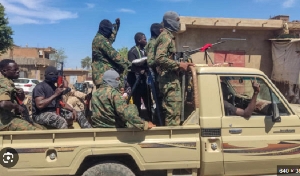- Home - News
- TWI News | TV
- Polls
- Year In Review
- News Archive
- Crime & Punishment
- Politics
- Regional
- Editorial
- Health
- Ghanaians Abroad
- Tabloid
- Africa
- Religion
- Election 2020
- Coronavirus
- News Videos | TV
- Photo Archives
- News Headlines
- Press Release
General News of Wednesday, 10 December 2003
Source: GNA
Veep indiscipline campaign not making impact- Short
Mr. Justice Emile Francis Short, the Commissioner for the Commission for Human Rights and Administrative Justice (CHRAJ), on Wednesday said the Vice President's laudable campaign against indiscipline has not made the necessary impact.
"Indiscipline poses a threat to the establishment of a stable democracy. Indiscipline undermines the rule of law and together with crime and violence poses a major threats to the safety, security and development of the nation," he said.
Mr Justice Short said the campaign ought to embrace other forms of indiscipline such as the failure of state functionaries to be punctual at official functions.
"The Commission would like to emphasise that leadership by example is the best way of ensuring the success of the campaign."
Mr Justice Short was speaking on "the State of Human Rights in Ghana" at a news conference to mark the International Human Rights Day.
December 10 is commemorated throughout the world as the International Day of Human Rights.
He said, apart from government functionaries, the Commission was of the view that one of the main areas of unbridled indiscipline is the indiscipline at the workplaces, especially the public sector.
Mr Justice Short said this has resulted in low productivity and waste of resources and that there was the need to reverse the apparent policy in the public sector that unproductive and undisciplined workers should not be sacked, thereby undermining discipline by their continued "contaminating" presence in the work place.
Mr Justice Short said contrary to police statistics that the incidence of armed robbery was on the decline, recent reported acts of robbery had assumed greater ferocity and pose a tremendous challenge to the security agencies.
The Commission, he said, applauded the efforts of the government to combat crime by setting up joint military/police patrols and providing the police with logistics to discharge their functions more effectively and efficiently.
Touching on arbitrary arrest and detention, Mr Justice Short said the annual inspection of police cells have shown that there was greater compliance with the 48-hour rule and fewer suspects are detained for more that the stipulated time.
He said there is still evidence of unacceptable number of remand prisoners incarcerated for long periods without trials in prisons.
Though he acknowledged the importance of the recent Presidential amnesty for a number of prisoners in decongesting the prisons, Mr. Justice Short said the deplorable conditions and the congestion in many of the country's cells and prisons remained a serious human rights concern.
He said there was the need for greater collaboration between all agencies involved in the administration of justice to deal effectively with the problem that constitutes a violation of Article 15 of the Constitution that provides that no person shall be subjected to cruel, inhuman and degrading treatment or punishment.
Mr Justice Short expressed the Commission's disappointment that very little had been done to improve the inhuman and intolerable conditions in police cells and prisons.
He said suspects are detained in cells which are small, dark, murky, poorly aerated and ventilated and are devoid of toilet facilities that pose a health risk not only top the suspects but the police officers in charge of the cells.
"The Commission urges the government, as a matter of urgency, to address the deplorable conditions in most police cells and prison", he said.
On freedom of speech and expression, Mr. Short the Commission was concerned about the number of complaints made to the National Media Commission (NMC) against the print media and the outcome of such complaints.
He said a disturbing find was the high incidence of the failure of journalist and reporters to check and verify the accuracy of information that came into their possession before publishing them, contrary to the Code of Ethics of the Ghana Journalist Association (GJA).
Mr. Short appealed to media practitioners to take reasonable steps to verify the accuracy of information they receive before publishing and called on the GJA and the NMC to redouble their efforts to ensure that high journalistic standards are maintained.
The Commission, Mr. Short said noted with satisfaction that there have not been confrontations between traditional authorities and come Christian churches during the annual ban on drumming by the Ga Traditional Council for the past two years.
He reminded the public that promoting religious freedom and tolerance was critical to the maintenance of peace and stability, adding, "We should also guard seriously against religious extremism in whatever form or shape".
Mr. Short expressed the Commission's concern about the continuing gender inequalities in the Ghanaian society and the fact that women were still under-represented in decision-making positions in spite of the fact that they constituted 51 per cent of the overall social population.
"It is on record that Ghanaian women are still confronted with socio-cultural and attitudinal barriers that impede their advancement and their equitable involvement in the making of decisions concerning national development", he stressed, adding that it is sad that Ghana has been rated one of the countries with the lowest percentage of women parliamentarians in Africa.
Mr. Short therefore, challenged society to support and promote women's participation in local and central governance and also entreated women to broaden their knowledge on issues of political, social and economic development so they may be well equipped to compete favourably with their male counterparts.
On violence against women, the Commission reiterated its call on victims of sexual harassment and domestic violence to break the silence and report all such acts to the Commission or institute action in courts since such act constituted serious violation of the right to human dignity, personal security and the right to be free from discrimination on basis of sex.
The Commission further called on parliament to formulate an appropriate legislative response to domestic violence by passing the Domestic Violence Bill into law to protect the rights of victims of domestic violence.
Mr. Short also expressed the Commission's displeasure on the recent report from its Northern regional office, which indicated that there were about 1,090 suspected women permanently resident at the "witches camps" in Yendi, Bimbilla and Gamabaga.
He renewed the Commissions pledge to work with NGOs and community-based organizations to prevent the cruel treatment meted out to suspected witches and work their re-integration into their respective communities.
Mr. Short noted that even though a lot had been done to create awareness about the prevention of HIV/AIDS and recent efforts to get Ghanaians to show compassion and empathy towards people living with HIV/AIDS (PLWHA) was welcome, not much attention has been paid to the human rights of such persons.
He said people living with the disease continue to be stigmatised and discriminated against because of their status and that this attitude posed obstacles to the effective control of the disease since HIV-related stigma discouraged voluntary testing.
Mr. Short called on the public to recognize that PWLHA are entitled to rights such as the right to life; the right to liberty; and security of the person; the right to the highest attainable standard of mental and physical health; the right to non-discrimination, equal protection and equality before the law and the right to work.
On corruption, he reiterated that an effective strategy to fight the canker required the concerted efforts of government, state institutions mandated to fight corruption, non-governmental organizations and the public.
He called on Ghanaians not to hesitate to report acts of bribery and corruption to the Commission and gave the assurance that the identity of persons who made such reports would not be disclosed if they so desired.
A message from the UN Secretary-General, Mr. Kofi Annan to commemorate the day, read by Mr. Alfred Salia Fawundu, the UNDP Resident Representative paid tribute to the courage and commitment of the brave men and women who defend human rights in every country.










